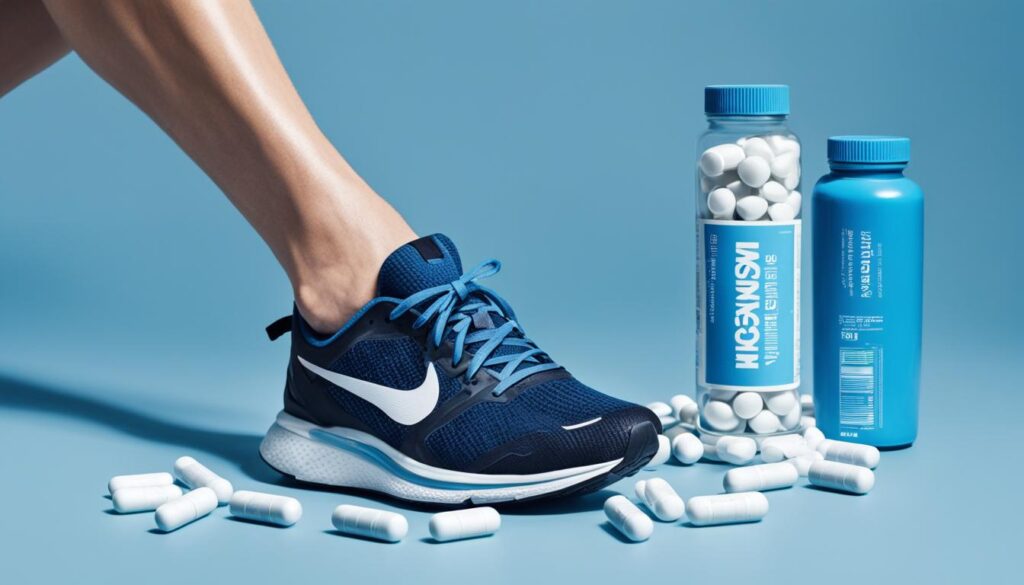A potential cause of leg cramps is a vitamin deficiency, although research is ongoing. Vitamins B1, B12, and D, along with potassium and magnesium, may help relieve leg cramps. While the exact cause of leg cramps is still unknown, common triggers include exercise, pregnancy, and electrolyte imbalances. Certain vitamin and mineral deficiencies, such as a lack of vitamins B1, B12, and D, as well as magnesium and potassium, have been linked to leg cramps. It’s important to note that the recommended dietary allowance (RDA) for these vitamins and minerals varies, and it’s always best to consult with a healthcare professional before taking supplements.
Key Takeaways:
- Vitamin deficiencies may contribute to leg cramps.
- Vitamins B1, B12, and D, as well as potassium and magnesium, may help prevent leg cramps.
- Exercise, pregnancy, and electrolyte imbalances can trigger leg cramps.
- Consult with a healthcare professional before starting any new supplements.
Leg cramps can be quite debilitating and can interfere with daily activities. However, there are measures you can take to prevent them. One possible cause of leg cramps is a deficiency in certain vitamins and minerals. By ensuring an adequate intake of these nutrients, you may be able to reduce the frequency and severity of leg cramps.
Vitamin B1 for leg cramp prevention
Leg cramps can be a result of various factors, one of them being a deficiency in vitamin B1. Individuals who lack vitamin B1 may experience muscle cramps in their legs. Fortunately, there are supplements available that may help prevent leg cramps and provide relief.
One such supplement is Nutricost Vitamin B1 (Thiamine) capsules. These capsules contain vitamin B1, also known as thiamine, which is crucial for proper muscle function. Another option is BulkSupplements Thiamine Mononitrate (Vitamin B1) Powder, a pure form of vitamin B1 that can be easily added to beverages or meals.
It’s worth noting that apart from supplements, vitamin B1 can also be obtained from certain foods. Whole grains, brown rice, pork, poultry, soybeans, nuts, dried beans, peas, and fortified grain products like cereal are all excellent sources of vitamin B1.
Vitamin B1 Food Sources
| Food | Vitamin B1 (mg per 100g) |
|---|---|
| Whole grains | 0.70 |
| Brown rice | 0.40 |
| Pork | 1.15 |
| Poultry | 0.35 |
| Soybeans | 0.66 |
| Nuts | 0.35-1.10 (depending on the type) |
| Dried beans | 0.71 |
| Peas | 0.26 |
| Fortified grain products (cereal) | Varies based on the product |
To ensure an adequate intake of vitamin B1 and help prevent leg cramps, consider incorporating these foods into your diet or speaking with a healthcare professional about suitable vitamin B1 supplements.
“I always make sure to include foods high in vitamin B1 in my diet to prevent leg cramps. Additionally, taking a vitamin B1 supplement has provided me with added support and relief. It’s important to consult with a healthcare professional to determine the right approach for your individual needs.”
Vitamin B12 for preventing leg cramps
People with a vitamin B12 deficiency may experience muscle cramps. Vitamin B12, also known as cobalamin, plays a crucial role in the formation and maintenance of red blood cells, nerve function, and DNA synthesis. As a result, inadequate levels of vitamin B12 can lead to various health issues, including muscle cramps.
To prevent leg cramps caused by vitamin B12 deficiency, individuals can consider taking cobalamin supplements. Here are some popular options:
| Supplement | Type |
|---|---|
| Jarrow Formulas Methylcobalamin (B-12) Chewable Lozenges | Chewable Lozenges |
| Wellabs Vitamin B-12 Extra Strength Liquid | Liquid |
| Naturelo Vegan B12 Capsules | Capsules |
It’s important to note that these supplements should be taken under the guidance of a healthcare professional. They can advise on the appropriate dosage and duration of supplementation based on individual needs and health conditions.
In addition to supplements, incorporating vitamin B12-rich foods into the diet can also help prevent leg cramps. Some good food sources of vitamin B12 include:
- Liver
- Beef
- Lamb
- Chicken
- Eggs
- Dairy products
Adding these sources of cobalamin to your meals can provide a natural way to increase your vitamin B12 intake and reduce the risk of muscle cramps. Remember to consult with a healthcare professional or registered dietitian for personalized advice regarding vitamin B12 supplementation and dietary recommendations.

Vitamin D for preventing leg cramps
Although more research is needed, vitamin D deficiency may contribute to muscle aches and pains. Adequate levels of vitamin D are essential for maintaining strong bones and muscles.
Some vitamin D supplements that may help prevent deficiency and reduce leg cramps include:
- Fit Ox Vitamin D3 Gummies
- Sports Research Vitamin D3+K2 Softgels
- Nature’s Bounty Vitamin D3 Softgels
Foods high in vitamin D include:
- Fatty fish like halibut, trout, and cod
- Morel mushrooms
- Pork, beef, and chicken
- Eggs and dairy products
- Orange juice
Ensuring adequate vitamin D levels may help improve muscle function and potentially reduce the frequency and severity of leg cramps. However, it’s important to consult with a healthcare professional before starting any new supplements.
Benefits of Vitamin D
Vitamin D plays a crucial role in calcium absorption, which is essential for maintaining strong and healthy bones. It also aids in muscle function and may help reduce the risk of falls in older adults. Additionally, vitamin D has been associated with immune system support, cardiovascular health, and mood regulation.
Research is ongoing to determine the specific impact of vitamin D on leg cramps. However, ensuring adequate vitamin D levels through supplements and a balanced diet may provide potential benefits for overall muscle health.
| Vitamin D Supplement | Key Features |
|---|---|
| Fit Ox Vitamin D3 Gummies | – Delicious gummy form – Provides a daily dose of vitamin D3 |
| Sports Research Vitamin D3+K2 Softgels | – Combination of vitamin D3 and vitamin K2 – Supports bone health and calcium utilization |
| Nature’s Bounty Vitamin D3 Softgels | – High-potency formula – Helps maintain strong bones and teeth |
Magnesium for preventing leg cramps
Magnesium deficiency has been linked to muscle cramps. Maintaining adequate magnesium levels can help prevent muscle cramps and promote overall muscle health. Incorporating magnesium-rich foods into your diet or taking magnesium supplements may be beneficial in reducing the frequency and intensity of leg cramps.
Some magnesium supplements that may help prevent magnesium deficiency and reduce leg cramps include:
- Nobi Nutrition Magnesium Complex Premium capsules
- Doctor’s Best High Absorption Magnesium tablets
Including foods that are high in magnesium in your diet is also recommended. Here are some examples of magnesium-rich foods:
- Green vegetables like spinach
- Nuts and seeds
- Unprocessed cereals
- Legumes
- Fruits
- Fish
- Meat products
Adding these foods to your meals can help provide you with the necessary amounts of magnesium to support muscle health and prevent leg cramps.

Magnesium-rich Foods
| Foods high in magnesium |
|---|
| Green vegetables like spinach |
| Nuts and seeds |
| Unprocessed cereals |
| Legumes |
| Fruits |
| Fish |
| Meat products |
Potassium for Preventing Leg Cramps
A potential cause of leg cramps is a deficiency in potassium, an essential mineral that plays a key role in muscle function. When potassium levels are low, it can contribute to muscle cramps and spasms. To help prevent potassium deficiency and reduce the occurrence of leg cramps, potassium supplements can be beneficial.
One popular potassium supplement for leg cramps is Life Enhancement Potassium Basics capsules. These capsules provide a convenient and effective way to supplement your diet with potassium, aiming to support muscle health and alleviate leg cramps.
In addition to taking supplements, incorporating potassium-rich foods into your diet can also help maintain adequate potassium levels. Some excellent food sources of potassium include:
- Bananas
- Avocados
- Sweet potatoes
- Spinach
- Beans
- Dairy products
By including these potassium-rich foods in your meals and utilizing potassium supplements like Life Enhancement Potassium Basics capsules, you can boost your potassium intake and potentially reduce the occurrence of leg cramps.
Benefits of Potassium for Leg Cramps
Potassium is a vital nutrient for muscle health and proper functioning. Here are some key benefits of potassium in relation to leg cramps:
- Muscle function: Potassium plays a crucial role in transmitting nerve signals and promoting healthy muscle contractions, making it essential for preventing muscle cramps.
- Electrolyte balance: Potassium works together with other electrolytes, such as sodium and magnesium, to maintain proper fluid balance in the body. This balance is important for preventing dehydration, which can contribute to leg cramps.
- Overall muscle health: Adequate potassium levels help support muscle strength, flexibility, and recovery, reducing the likelihood of muscle cramps and discomfort.
Ensuring sufficient potassium intake through a combination of supplements and potassium-rich foods can be an effective approach to preventing leg cramps and maintaining optimal muscle function.
Did You Know?
Potassium works alongside magnesium to regulate muscle contractions. Both minerals are important for preventing muscle cramps and spasms.
| Potassium-Rich Foods | Potassium Content (per 100g) |
|---|---|
| Bananas | 358mg |
| Avocados | 485mg |
| Sweet potatoes | 337mg |
| Spinach | 558mg |
| Beans | 561mg |
| Dairy products | 366-429mg |
Table: Potassium content in selected potassium-rich foods (per 100g)
Including potassium supplements like Life Enhancement Potassium Basics capsules and potassium-rich foods in your diet can play a significant role in preventing potassium deficiency and reducing the risk of leg cramps. However, it’s important to consult with a healthcare professional before starting any new supplements or making significant dietary changes.
Natural Remedies and Supplements for Leg Cramp Relief
In addition to vitamins and minerals, there are various natural remedies and supplements that can provide relief from leg cramps. Incorporating these remedies into your routine can help alleviate discomfort and improve overall leg health.
Drinking Plenty of Water
Staying hydrated is crucial for preventing leg cramps. Dehydration can lead to muscle spasms and cramps, so it’s important to drink an adequate amount of water throughout the day. To encourage hydration, carry a water bottle with you and sip water regularly.
Consuming Electrolyte-Rich Foods
Electrolytes play a vital role in muscle function, and imbalances can contribute to leg cramps. Include foods that are rich in electrolytes in your diet to maintain proper muscle function. Some examples of electrolyte-rich foods include:
- Coconut water
- Bone broth
Incorporating Nutrient-Dense Foods
Certain foods can provide essential vitamins and minerals that support healthy muscles and reduce the risk of leg cramps. Incorporate the following nutrient-dense foods into your diet:
- Papaya
- Beet greens
- Fermented foods
- Salmon
- Smoothies with mixed fruits and greens
- Sardines
Supplements for Leg Cramp Relief
In addition to natural remedies, supplements can also be beneficial for alleviating leg cramps. Here are some supplements that may provide relief:
| Supplement | Description |
|---|---|
| Magnesium | Helps relax muscles and reduce cramping. Nobi Nutrition Magnesium Complex Premium capsules and Doctor’s Best High Absorption Magnesium tablets are popular options. |
| Potassium | Supports muscle function and regulates electrolyte balance. Life Enhancement Potassium Basics capsules are a commonly recommended potassium supplement. |
Always consult with a healthcare professional before starting any new supplements to ensure they are suitable for your specific needs and medical history.
By incorporating these natural remedies and supplements into your routine, you can find relief from leg cramps and support overall leg health. Remember to stay hydrated, consume electrolyte-rich foods, and consider the appropriate supplements to promote optimal muscle function and prevent leg cramps.
Conclusion
In conclusion, leg cramps can be a result of various factors, including vitamin and mineral deficiencies. To prevent leg cramps, incorporating vitamins B1, B12, and D, as well as magnesium and potassium, into your diet or taking appropriate supplements may be beneficial. However, it is essential to consult with a healthcare professional before starting any new supplementation regime.
Additionally, maintaining hydration by drinking plenty of water and consuming electrolyte-rich foods and beverages is crucial for preventing leg cramps. Natural remedies such as incorporating foods like papaya, beet greens, fermented foods, salmon, smoothies, and sardines into your diet may also provide relief. It is important to remember that each person’s body is different, and remedies may vary from person to person.
If you experience recurring leg cramps or concerns regarding leg cramp prevention, it is advisable to consult with a healthcare professional. They can provide personalized guidance based on your specific needs and help you develop an appropriate treatment plan. With the right approach, you can find relief from leg cramps and improve your overall well-being.
FAQ
Are there any vitamins effective for preventing leg cramps?
Certain vitamins such as B1, B12, and D, along with potassium and magnesium, may help relieve leg cramps. However, it’s important to consult with a healthcare professional before taking any supplements.
What are some vitamin B1 supplements for preventing leg cramps?
Some vitamin B1 supplements that may help prevent leg cramps include Nutricost Vitamin B1 (Thiamine) capsules and BulkSupplements Thiamine Mononitrate (Vitamin B1) Powder.
What are some vitamin B12 supplements for preventing leg cramps?
Some vitamin B12 supplements that may help prevent leg cramps include Jarrow Formulas Methylcobalamin (B-12) chewable lozenges, Wellabs Vitamin B-12 Extra Strength liquid, and Naturelo Vegan B12 capsules.
What are some vitamin D supplements for preventing leg cramps?
Some vitamin D supplements that may help prevent deficiency and reduce leg cramps include Fit Ox Vitamin D3 Gummies, Sports Research Vitamin D3+K2 Softgels, and Nature’s Bounty Vitamin D3 softgels.
What are some magnesium supplements for preventing leg cramps?
Some magnesium supplements that may help prevent deficiency and reduce leg cramps include Nobi Nutrition Magnesium Complex Premium capsules and Doctor’s Best High Absorption Magnesium tablets.
What are some potassium supplements for preventing leg cramps?
Some potassium supplements that may help prevent deficiency and reduce leg cramps include Life Enhancement Potassium Basics capsules.
What are some natural remedies and supplements for leg cramp relief?
Other natural remedies and supplements that may help relieve leg cramps include staying hydrated, consuming electrolyte-rich foods and beverages, and incorporating foods high in potassium, magnesium, and vitamins B1, B12, and D into the diet.
How can I prevent leg cramps?
Along with considering vitamin and mineral supplements, it’s important to stay hydrated, maintain a balanced diet, exercise regularly, and address any underlying health conditions that may contribute to leg cramps. If leg cramps persist or worsen, it’s recommended to consult with a healthcare professional.
Can vitamin deficiencies cause leg cramps?
While the exact cause of leg cramps is still unknown, certain vitamin and mineral deficiencies have been linked to leg cramps. However, it’s important to note that the recommended dietary allowance (RDA) for these vitamins and minerals varies, and it’s always best to consult with a healthcare professional before taking supplements.
What should I do if I experience frequent leg cramps?
If you experience frequent leg cramps, it’s important to consult with a healthcare professional to determine the underlying cause and develop an appropriate treatment plan. They may recommend lifestyle changes, supplements, or other interventions to help prevent and manage leg cramps.





